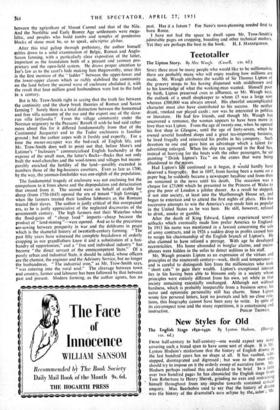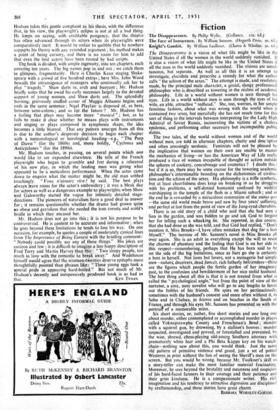New Styles for Old
FROM half-century to half-century—one would expect any story covering such,a broad span to have some sort of shape. It is Mr. Lynton Hudson's misfortune that the history of English drama in the last hundred years has no shape at all. It has vaulted, side- stepped, disintegrated and digressed ; but woe to the man oho should try to impose on it the orderly sweep of narrative form. Mr. Hudson perhaps realised this and decided to be brief. In a little over two hundred pages he has chronicled the English stage from Tom Robertson to Henry Sherek, grinding no axes and restraining himself throughout from any impulse towards sustained critical enquiry. Max Beerbohm used to say that the history of drama was the history of the dramatist's sure eclipse by the, actor ; Mr Hudson takes this gentle complaint as his thesis, with the difference that, in his view, the playwright's eclipse is not at all a bad thing. He keeps on saying, with creditable pungency, that the theatre has often advanced through its actors when its playwrights were comparatively inert. It would be unfair to quibble that he nowhere suppqrts his theory with any extended argument ; his method makes a point of being cursory, and there is no room for him to add that even the best actors have been routed by bad scripts.
The. book is divided, with simple ingenuity, into ten chapters, each covering ten years. The big names pop in and out ; we catch them in glimpses, fragmentarily. Here is Charles Kean staging Shake- speare with a crowd of five hundred extras ; here Mrs. John Wood bewails the intransigence of managers who continually.ask her to play "tragedy." Shaw darts in, arch and buoyant ; Mr. Hudson briefly notes that he owed his early successes largely to the devoted support of young women, and Shaw darts out. The splendidly burning, grievously snuffed career of Meggie Albanesi begins and ends in the same sentence ; Nigel Playfair is disposed of, as here, between semi-colons ; and as for the future ? Mr. Hudson has a feeling that plays may become more " musical " ; but, as he fails to make it clear whether he means plays with instruments and singing or plays composed in symphonic shape, the idea becomes a little blurred. That any pattern emerges from all this is due to the author's desperate decision to begin each chapter with a meteorological or horological heading—e.g., " The Peep of Dawn " (for the I860s) and, more boldly, "Cyclones and Anticyclones " (for the 1890s).
Mr. Httdson touches, in passing, on several points which one would like to see expanded elsewhere. He tells of the French playwright who began to grumble and fret during a rehearsal of his new play, in which the leading man was giving what appeared to be a meticulous performance When the actor came down to enquire what the matter might be, the old man sobbed touchingly. " Vous n'ajoutez den ! he said. The best plays always leave room for the actor's embroidery ; it was a bleak day for actors as well as a dangerous example to playwrights when Shaw and Galsworthy started the vogue for infinitely detailed stage- directions. The pioneers of naturalism have a good deal to answer for ; it remains questionable whether the drama had grown quite so obese and garrulous that she needed the iron corsets and scold's bridle in which they encased her.
Mr. Hudson does not go into this ; it is not his purpose to be controversial. He is content to be accurate and informative ; when he goes beyond these limitations he tends to lose his way. On one occasion, for example, he quotes a couple of moderately cynical lines from The Importance of Being Earnest with the bristling comment: " Nobody could possibly say any of these things." His jokes are curious and few ; it is difficult to imagine a less happy description of Fred Terry and Martin Harvey than this: " TsVo sleepy people, too much in love with the romantic to -break away." And Wodehouse himself woujd agree that the nineteen-twenties deserve epitaphs more
thoughtfully. pointed than phrases "These young eggs took a special pride in appearing hard-boiled." But not much of Mr. Hudson's decently and' inexpensively produced book is as bad as



































 Previous page
Previous page